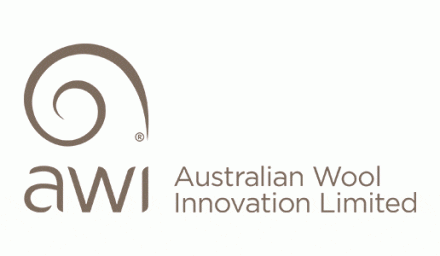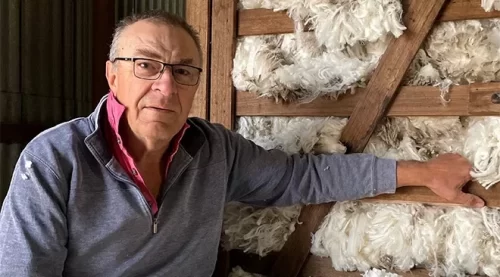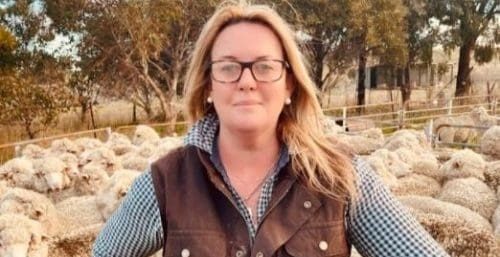 AUSTRALIAN Wool Innovation’s chief executive officer has declined to outline how the company will help growers take advantage of non-mulesed wool price premiums and sheep meat opportunities for Merinos in its 2025-28 strategic plan and 2025-26 annual operating plan, despite critical market and flock decline signals.
AUSTRALIAN Wool Innovation’s chief executive officer has declined to outline how the company will help growers take advantage of non-mulesed wool price premiums and sheep meat opportunities for Merinos in its 2025-28 strategic plan and 2025-26 annual operating plan, despite critical market and flock decline signals.
AWI’s unchanged attitude and actions on the market’s non-mulesed wool preference has prompted the nation’s peak wool grower body to urge the industry to have “some very tough conversations” on the issue, while animal welfare bodies believe AWI’s stance on mulesing is jeopardizing the Australian industry.
The strategic plan defines AWI’s goal as: “To enhance the profitability, competitiveness and sustainability of the Australian wool industry through research, development, extension and demand creation.”
In his strategic plan message, AWI CEO John Roberts writes that important areas of AWI’s on-farm investment include genetics, reproduction and nutrition, animal health and wool harvesting, “all designed to deliver improved productivity and profitability.”
“AWI will invest in on-farm research collaborations with partners including governments, RDCs, universities and industry.
“Such collaborations will enable AWI to leverage greater funds to invest in activities that deliver value to Australian wool growers,” he said.
“In the post-farm area, AWI will partner with leading manufacturers, brands and retailers across the world to explore new opportunities for Australian wool and carry out joint demand creation campaigns that are cost-effective and market-focused.”
However, Australia’s wool industry leaders, including AWI executives and board members, were recently told at the International Wool Testing Organisation’s Congress in France that Chinese and European processors preferred certified non-mulesed wool from countries that have banned mulesing – South Africa and New Zealand. The latest industry figures indicate that only about 15 percent of Australia’s Merino wool comes from non-mulesed sheep, with 24.1 percent of tested wool and 22.6pc of auction wool declared as non-mulesed. About 43pc of South Africa’s wool clip is certified non-mulesed under the Responsible Wool Standard.
Non-mulesed wool price premiums recently hit 150c/kg-plus clean at the nation’s auctions and Mecardo analysis shows that in recent months median premiums for Responsible Wool Standard (certified non-mulesed) fleece wool have been around 100 cents per clean kg for Merino and crossbred.
AWI’s strategic plan is proposing to spend between $31.1-$35.2 million on fibre demand creation and advocacy annually over the next three years, more than double the expenditure on on-farm sustainability and profitability of $13.5-$15 million. This is despite global economic circumstances keeping wool prices and demand low, while sheep meat demand and prices are high with finished Merino lambs selling for more than $300 in saleyards and performing well on lamb eating quality grids.

AWI CEO John Roberts – no comment.
However, Mr Roberts has refused to answer a series of questions about how he believes the AWI plans will keep sheep on farms, in the face of an ongoing decline in the national flock, and especially in Merino numbers. AWI’s general manager of consultation and engagement Kevin Wilde thanked Sheep Central for its questions for Mr Roberts, but replied: “We will not be commenting.”
Despite many of AWI’s wool promotion collaborators using non-mulesed wool in their products, Mr Roberts would not explain why there is no mention in the strategic plan or the AOP of how AWI is proposing to address the market’s preference for non-mulesed wool, nor why there is no direct mention of fostering or increasing non-mulesed wool production in Australia under Pillar 1 ‘Grow Demand and Fibre Advocacy’ nor under Pillar 2 ‘Sustainable and Profitable Wool-growing’.
Mr Roberts would not comment on whether AWI’s often stated agnostic position to represent all wool growers in marketing by default supports continued production of wool from mulesed sheep, that the nation’s customers do not prefer.
Mr Roberts also would not outline how AWI could justify continuing to spend more than twice on ‘growing demand and fibre advocacy’ than on ‘sustainable and profitable wool-growing’ to only achieve an increase in “consideration for Merino wool by 2pc” when Merino flock profitability is currently underpinned by sheep meat market returns. AWI told Sheep Central ‘consideration for Merino wool’ is a metric measuring whether consumers would consider buying Merino wool after seeing a campaign.
The AWI CEO chose not to comment on whether it might be time for AWI to switch its focus from wool promotion to keeping Merinos on farms promoting grower investment in by increasing non-mulesed wool production and developing the meat/carcase and reproductive qualities of their sheep.
Within that context, Mr Roberts also would not comment on whether AWI has committed to increasing its collaboration with MLA on sheep productivity and genetics research. Mr Roberts also would not specify in what areas AWI has made cuts to ensure its operation is sustainable and relevant to its remaining shareholders.
‘No action on mulesing’ plan is the industry’s plan – Laurie

AWI chairman Jock Laurie in the wool. Image – AWI.
AWI chairman and non-mulesed wool producer Jock Laurie was also asked if the new strategic plan addressed the current sheep meat prices and the 150c/kg premiums for non-mulesed wool to help keep sheep on farms.
Mr Laurie said it was the industry’s plan.
“I don’t want the board interfering and driving a strat plan that suits the board of the company, I want it to reflect the issues of the industry.
“The issues of the industry are very much varied on a whole range of issues,” he said.
“We do know the critical importance of the meat sheep component at the moment and a lot of the work that has been done around the Merino Lifetime Productivity (project) and the genetic outcomes of MLP, and getting more growth, more fertility, is all about delivering more profitability in the sheep meat component of the industry.”
He said there has been plenty of data collected around Australian Sheep Breeding Values and direct classing “and people can make their judgement internally on those,” but AWI would continue to invest in the outcomes. He said work that MLA has done also helped in this area.
On the issue of non-mulesed wool and the market, Mr Laurie said: “when it comes to the (wool) market itself, because of the diversity of wool growers, the industry has to provide opportunities for all wool growers because of their different circumstances on farm, for all wool growers to make up their own mind.”
“They need to understand what the market is doing and they do that regularly, we try to provide that market information,” he said.
Mr Laurie said one of the frustrating things is that he has been honestly trying to provide information that AWI is getting from the marketplace.
“And all of the market signals we’ve been getting and the information people have been telling us around sustainability and biodegradability and what a magnificent fibre it is and everyone around the world wants it, but that’s not being reflected in the markets.”
He reiterated that the strategic plan is “what the industry wants” and it was not for the board to “correct” that.
Mr Laurie said it was up to AWI to provide the market signals so growers could “make up their minds” and show how ASBVs could be utilised in their businesses “if that’s what they want to do.”
“And then make their decisions on farm about how they want to drive it – now if that means going down a non-mulesed path then we’re very happy to do that.”
Mr Laurie said AWI has told companies across the world that if they wanted non-mulesed wool they would “get as much as you want in Australia, you’ve still got to send a signal for growers to produce it for you because there is a cost of producing non-mulesed wool.”
“So when people make a decision they will want to really understand that there is going to be a reason and purpose for doing it.
“I would say some people who are getting out of the game now are getting out of the game for a multitude of reasons,” he said.
“And if they wanted to move to non-mulesed then they possibly aren’t happy to do that, there is not enough profitability in the market at the moment so they are making decisions about where to go elsewhere, to go into a meat sheep breed or cattle or cropping.”
He said there has been pressure on the WA flock due to the political decision to phase out live sheep exports, and there is a massive drought in South Australia and Victoria.
“But you can’t use that as an excuse because there is always a drought in Australia somewhere … but some of the other factors that we are seeing at the moment are a reflection of the market – you’ve got to be honest about that.”
Time for some tough conversations – Wool Producers of Australia

WoolProducers Australia CEO Jo Hall.
WoolProducers Australia chief executive officer Jo Hall said there is no doubt that accredited or certified non-mulesed wool is being requested by the trade.
“The need for this is identified in the Wool 2030 Strategy, which has a target of ‘more than 50pc of wool is sold under a quality certification scheme’.
“While South Africa produces a much smaller volume of apparel wool compared to Australia, they are forecasting that 50pc of their total clip and 71pc of their Merino wools will be certified for the 2024/25 season,” she said.
Ms Hall said the problem for many growers at this point in time when the market is depressed, that these schemes cost money to enter and there are not consistent premiums being delivered for this additional cost.
“The Australian wool industry needs to start having some very tough conversations.
“This is not about setting a date to ban mulesing, rather it is about taking our heads out of the sand and starting to have the strategic industry-wide discussion without fear of personal attacks and retribution – something that should have been started about 15 years ago,” she said.
“It is undeniable that mulesing remains a huge threat to the future of our industry that is simply not being addressed in an appropriate manner.
“We heard numerous times from other production countries during their presentations to promote their own wool, that they were proudly non-mulesed – it is the first point of distinction that every other country makes,” Ms Hall said.
WoolProducers has had policy since 2018 to mandate the use of pain relief for mulesing, made in the interests of ensuring the longevity of mulesing and improving the optics around the practice; however, personal agendas and industry politics have got in the way of this,” Ms Hall said.
“Unfortunately, still to this day, there are other grower bodies railing against this call, which is extremely detrimental to Australia’s reputation.”
Ms Hall doesn’t believe the messaging around how big of an issue mulesing is has been made clearly enough to Australian growers, which is a huge disservice to them.
“This is not about telling growers what to do, this is about providing them with market sentiment information so that growers can then make an informed decision – something that simply has not been done to date.”
Despite AWI chairman Jock Laurie’s claims that AWI has made market information on non-mulesed wool available to grower, AWI has refused to release a report into consumer sentiment on the practice and negotiated to the change the scope of the study, denying growers key market knowledge.
“WoolProducers are also aware that at a time where woolgrowers are doing it extremely tough, that we do not want to add to the burden of growers, but Australian industry inaction on this issue over many years has meant that we now have our largest buyer having a preference for a competing producer country,” Ms Hall said.
“Of course we do not want government regulation regarding the banning of mulesing and we would continue to strongly argue against such a move if any government indicated they were going to do so, but industry does need to have a serious discussion about our what both our international reputation and market access looks like in the future.”
AWI’s mulesing stance supports business as usual
FOUR PAWS Australia program lead Louise Ward said AWI’s so-called “agnostic” stance on mulesing is not neutral.
“It is a default endorsement of the status quo which continues to allow production and marketing of wool from live lamb cut or mulesed sheep.
“A status quo that is failing lambs, consumers and the wool growers who are missing out on markets and premiums,” she said.
“This position is increasingly out of step with both global market expectations and animal welfare standards.”
Ms Ward said for over two decades, AWI has refused to take a clear stance on phasing out mulesing, despite publicly committing in 2004 to end the practice by 2010.
“That promise was abandoned, and since then, more than 140 million lambs have been subjected to this painful and outdated procedure.
“Meanwhile, the solution breeding plain-bodied, flystrike-resistant sheep is already in use by thousands of Australian wool growers and has been proven to be cost-effective, humane, and commercially viable,” she said.
“AWI’s inaction has not only harmed animal welfare it has let down the very growers it claims to represent.
“By refusing to lead a structured, well-funded transition away from mulesing, AWI is jeopardising the future of the Australian wool industry in a global market that is increasingly demanding ethical and sustainable sourcing.”
Ms Ward said the shift in South Africa toward a large portion of the clip being Responsible Wool Standard certified is a direct result of Australia’s failure to meet global animal welfare expectations.
“Meanwhile, AWI has wasted tens of millions of dollars in levy fees and taxpayer funds on failed or stalled projects including a flystrike vaccine and fly sterilisation research while largely ignoring the proven breeding solution already adopted by thousands of Australian growers.
“AWI’s so-called ‘neutral’ stance on mulesing is not neutral at all- it’s a green light for business as usual.”
Ms Ward said while South Africa’s non-mulesed wool is trading at a premium and gaining ground in China, Australia is being left behind.
“The industry has had 20 years to act.
“Instead of backing the solution that works, AWI has let growers down by failing to provide the tailored, one-on-one bespoke support they need to transition based on their individual farm needs.”
Ms Ward said FOUR PAWS is urging AWI and government stakeholders to stop investing in failed solutions and instead fund the transition to plain-bodied sheep—providing growers with the bespoke support they need to make the shift based on their individual farm business needs.
“This is not just an animal welfare issue—it’s a trade issue.
“If AWI won’t lead, the government must step in.”
Humane World for Animals animal welfare program manager Georgie Dolphin, said the organization is disappointed to see a distinct lack of progress by the wool industry leaders to move away from mulesed wool production, reflected in Australian Wool Innovations’ latest Strategic Plan and Annual Operating Plan.
“The recent International Wool Textile Organisation (IWTO) Congress in France revealed that South Africa is now China’s preferred supplier of wool due to the availability of Responsible Wool Standard (RWS) accredited (non-mulesed) wool.
“Numerous other production countries claimed they were also proudly non-mulesed as a selling point,” she said.
“Australia risks losing more market share if they do not fast-track ending live lamb cutting (mulesing).
“The solution that could see an end to live lamb cutting and mitigate flystrike in Australian Merino sheep already exists — breeding flystrike resistant plain-bodied sheep — yet according to the AWI strategic plan, $48.5M has been spent on flystrike over the past two decades.
“Humane World for Animals believes that committing to a phase out of live lamb cutting is vitally important, not only for sheep welfare, but for the social viability of the Australian wool industry now and into the future.”

It’s so frustrating to read this article. Our family farming operation ceased mulesing in 2004. It was the moral decision for our lambs’ welfare and to build a positive animal welfare stance for the future of the Australian sheep flock. There are many trial examples showing the benefits of using advanced genetics for Wool, meat and animal welfare. The recent Balmoral sire evaluation trial displayed progeny — all unmulesed — from sires that achieved outstanding research flystrike resistance while producing $120 per lamb more in meat and wool than other sires in the trial. Trust and traceability with our sheep industry products needs to be addressed. The National Wool Declaration (NWD) needs to be mandatory to sell your wool.
Electronic National Vendor Declarations (eNVD) need to have pain relief management and mulesing status incorporated in the declaration. MLA and ISC, like AWI, have been very inactive in building trust and transparency into our wool and meat product for our international markets.
AWI needs to be wound up. it is destroying the Merino industry. I call on all AWI directors to resign. They are all a disgrace to wool growers’ viability due to their combined lack of leadership. They are holding the wool industry back. They cannot lead the industry to new highs that is, oh, so close if only we had leadership. People are screaming out for a natural, greener world. Wool is as natural as you can get. Why is it that an animal welfare organisation has to show the way?
The Australian government must step in to save the industry, rural economy and ban mulesing as in New Zealand where growers voted out the wool board. There is too much to lose economically, not only for Australian wool growers, but for the wider business community and country towns, especially in the drier areas where crops can’t be grown. Just grow up and come of age; get your head out of the 1950s and ban mulesing.